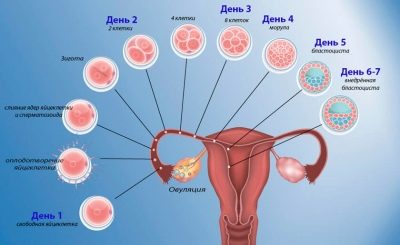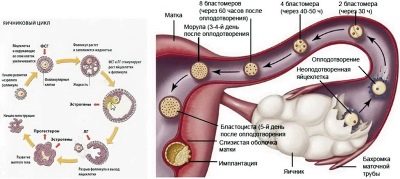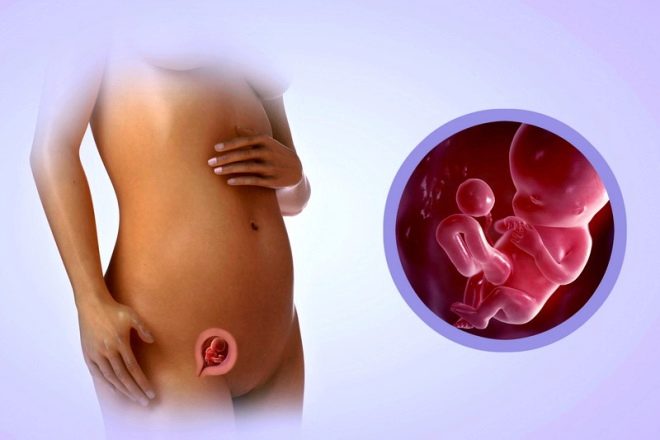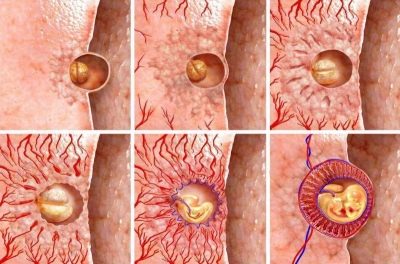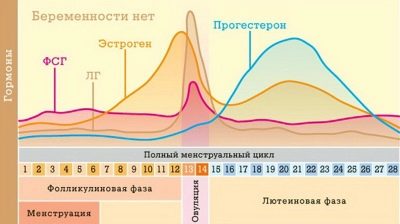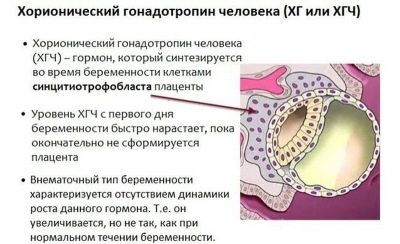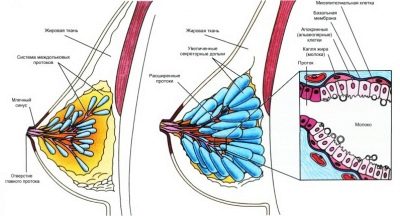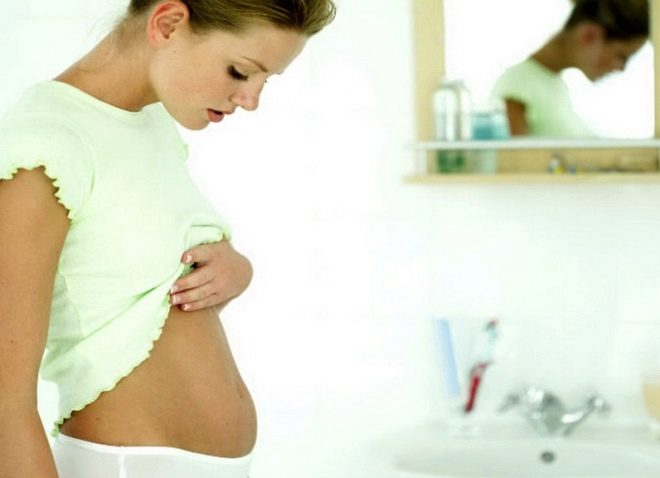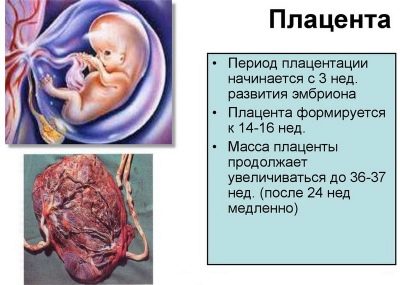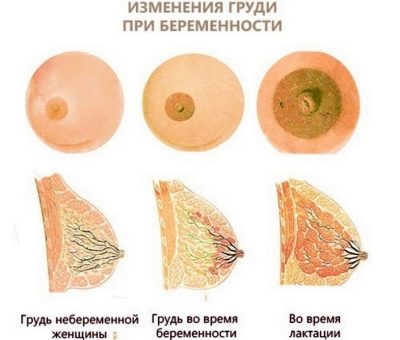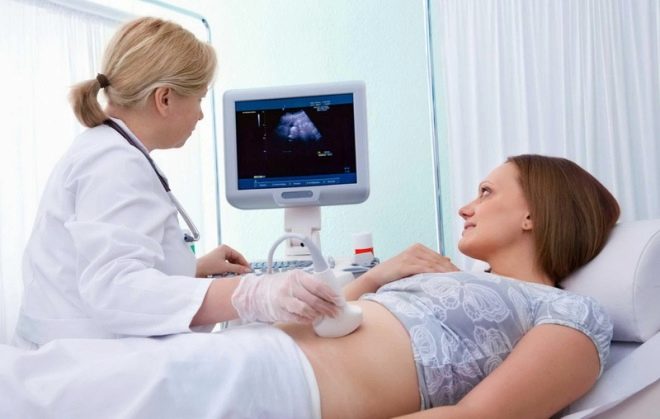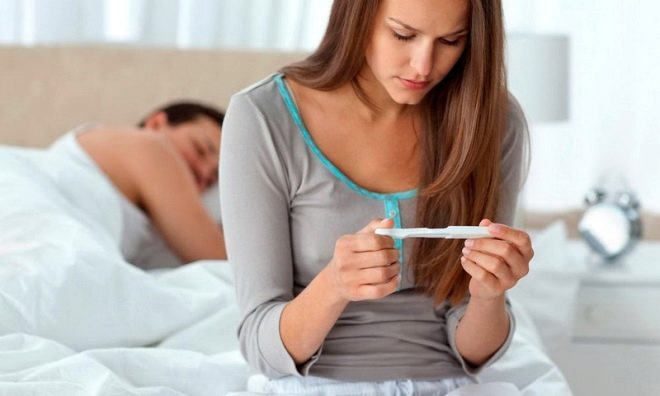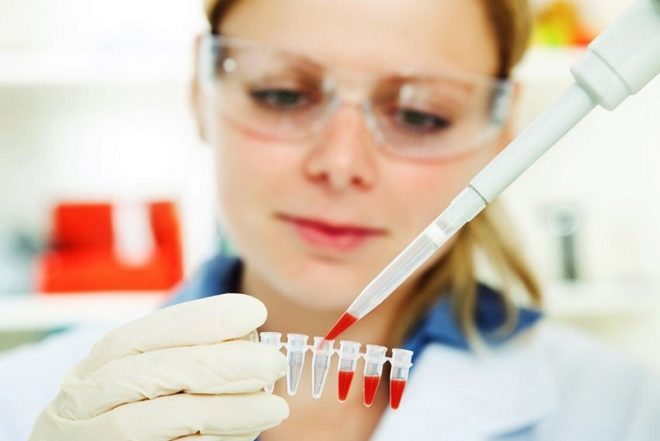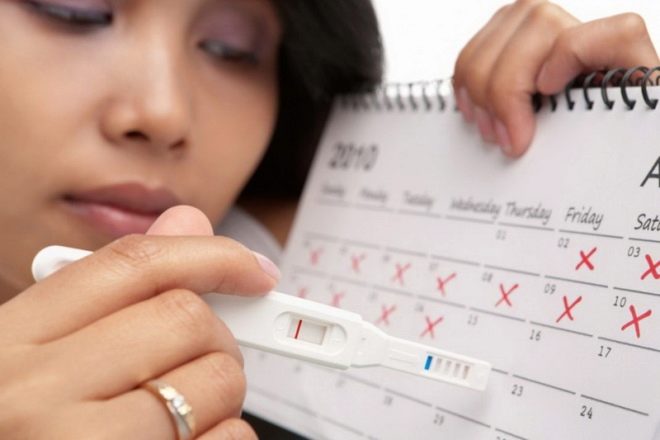The first signs of pregnancy in the early stages
Today on the Internet you can find a lot of articles that promise to reveal the "33 signs of pregnancy in the earliest terms" or "determine the sex of the child one week after conception." Sensible women are skeptical of such information, because the vast majority of such articles have nothing to do with the truth. But the question nevertheless remains open - how can we determine pregnancy in the earliest terms and is it possible to do this at all?
In this article we will look at this topic in detail and try to find an honest and truthful answer to each of the women's questions about the early diagnosis of the “interesting situation”.
How does it start?
In most cases, an interesting and surprising period of the birth of a new life passes by a woman, she simply does not notice him. The majority starts to suspect something only when the next menstruation does not occur. Indeed, medicine considers the delay of menstruation as the very first, but still an indirect sign of pregnancy.
The delay can be caused not only by pregnancy, but also by cycle disturbances, hormonal disruptions, inflammatory processes in the pelvic organs and a host of other causes.
Women who are very much waiting for pregnancy, plan it, try to “get” in a favorable period for conception, on the contrary, “listen” to any changes in their body throughout the second half of the cycle. The search for symptoms and signs for them sometimes turns into an almost manic idea.
In order to be more relaxed and sensible about this issue, one should be well aware of how conception occurs and when, in principle, the first signs of an “interesting situation” can appear.
Fertilization of the oocyte (egg) is possible only during one day during the whole month. And the name of this day is ovulation. The ovum becomes accessible to the male germ cells only after it leaves the bursting follicle and about 24 hours after this “event”. Spermatozoa at the time of ovulation may already be in the female’s genital tract (if sex was a couple of days before) or reach the oocyte within 24 hours after the female cell leaves the follicle in the ovary (if sex occurred on the day of ovulation or during the day).
There are no other fertile "windows" in the female cycle. The only exception is a rare case of the development of two eggs at once, one of which comes out earlier, and the other later. In this case, the second can be fertilized, and then conception will take place much later than the calendar calculations.
After penetration into the egg membranes, the sperm cell begins to give its DNA information to it. Thus, a zygote begins to form, 50% consisting of paternal genetic material, and 50% of maternal. Fertilization occurs in the fallopian tube. From there, the zygote begins its way into the uterus within a few hours after fertilization.
The egg itself cannot move, the villi “help” it, covering the inner part of the fallopian tube, as well as imperceptible for a woman contractions of the tube walls. Along the way, the zygote increases, breaks up and becomes a blastocyst.At 6-8 days after ovulation (not after intercourse!), The blastocyst descends into the uterine cavity.
It is here that the baby will have to spend the next nine calendar months. But for this, the blastocyst must first be successfully fixed in the uterine wall. While she was “traveling” through the tube and her mouth, the hormone progesterone began to be produced in the woman’s body. It was he who launched the first changes in the structure of the uterine endometrium. The internal membranes of the reproductive organ became loose, more filled with blood.
Implantation occurs within a few hours - due to the enzymes contained in the membranes, the fertilized egg can partially dissolve the endometrial cells and literally “infiltrate” or “grow” into it. Chorion cells immediately begin to perform two important functions: they provide the connection of the ovum with the uterus, the flow of maternal blood, and also produce and emit into the female bloodstream a special substance - chorionic gonadotropic hormone (hCG). HCG contributes to the additional production of progesterone. It turns out a vicious circle.
Theoretically, a woman may notice the first sensations at any stage of the progress of the ovum and its implantation, but it is impossible to call them specific. Rather, they will be associated with an increase in progesterone level, and a week after conception - with an increase in hCG level. Therefore, the answer to the question whether it is possible to feel pregnancy so early is not so easy to find. Theoretically, it is possible, but in practice, a rare woman has such a high sensitivity.
Feeling up to delay
The first sensations are always subjective. If a woman really wants to be pregnant, then she often gives out wishful thinking and just "thinks out" her symptoms. Sometimes the signs of premenstrual syndrome (PMS) are mistaken for the early signs of pregnancy (they really are very, very similar!).
It should be noted that premenstrual syndrome is not inherent in all women, and therefore the appearance of unusual sensations they usually do not go unnoticed.
As already stated The first signs before a delay in menstruation can begin at any time. Progesterone, the level of which in the blood rises within an hour and a half after ovulation, begins to prepare the female body for pregnancy even before fertilization takes place. It relaxes the uterine smooth muscles, preventing uterine contractions. It suppresses maternal immunity so that it does not reject the birth of a new life, because for the immune system the embryo is half alien (it contains 50% of the man’s genetic material that is alien to the woman’s body, his immunity “does not know”).
Progesterone in the first days after implantation begins to “work” as a “assistant”, increasing the female appetite to create reserves of fat and glucose for the growth and development of the baby “for a rainy day”. Progesterone helps to preserve the pregnancy, which is why implantation may not take place when it is deficient in the body, and if the fertilized egg is still able to gain a foothold, it is more likely that it will be torn off and die in the shortest possible time.
An increase in the level of progesterone, and after implantation - and human chorionic gonadotropin, leaves an imprint on the work of all organs and systems of the female body at the biochemical level. Therefore, even before the delay, the following symptoms and signs are quite possible.
Increased fatigue
Fatigue for no apparent reason is a consequence of the intensive work of the body in the face of changed hormonal background, energy costs become greater. Such a sign may appear within 6-7 days after ovulation.
Signs of a cold
The symptoms of a cold are runny nose, nasal congestion without snot, difficulty breathing, general malaise. These symptoms are a consequence of the inhibitory effect of progesterone on the female immune system. In addition, progesterone slightly retains fluid in the tissues, which is why a runny nose appears, which is called the physiological rhinitis of pregnant women.
From a real cold or viral infection, this condition can be distinguished by the absence of high temperature, liquid discharge from the nose, cough.
From the point of view of biochemical processes, such a symptom can occur when the concentration of progesterone reaches a rather high level, that is, not the next day after conception, but only after 8-10 days.
Sleep disturbance
In other words, insomnia or increased sleepiness. Normal sleep violates not only progesterone, which affects certain receptors of the nervous system in a completely unpredictable and unexpected way, but also a special center in the cerebral cortex - the “center of pregnancy”. This is a temporary impulse center that appears after fertilization and disappears after giving birth. His task is to regulate all the nervous and physiological processes that are somehow related to the period of gestation.
The work of this center in some pregnant women leads to the development of first trimester toxicosis. Until the monthly delay, the new center of the brain still does not interfere with the “neighbors” - the emetic center, the center of thermoregulation, and others, but is already beginning to declare itself. This is manifested in the violation of certain neural connections, which causes difficulty in falling asleep, jerky and restless sleep at night, frequent awakenings.
Sometimes the body’s reaction to the appearance of a new center in the cerebral cortex is the opposite - a woman begins to fall asleep in any position of the body, in any place and at any time, if she is left at least for a while. Sleep disturbances can occur as early as 4-5 days after conception.
Mood Swings
Mood swings are a very difficult symptom for self-diagnosis. Most women and outside of pregnancy in the second phase of the menstrual cycle are not particularly balanced. But if fertilization did take place, then the first symptoms of emotional “swing” can only appear after implantation, when the hCG hormone begins to be produced. In combination with progesterone, it has a suppressive effect on the central nervous system of a woman.
This effect was designed by nature to preserve the life of the embryo, because excessive emotional and mental outbursts can harm the development of offspring at any stage of pregnancy. In practice, most often it looks like this: a woman becomes unstable, her mood changes from sadness to joy, she easily becomes irritated and becomes slightly distracted and forgetful.
This symptom may be during premenstrual syndrome, but the mechanism of mood swings with PMS will be slightly different - only progesterone. A woman with PMS is more irritable and even aggressive. If pregnancy has come, teariness, resentment, aggression are more often observed, aggression is a rarity.
The first tangible changes in her mood a woman can begin to feel on the 10-11 day after ovulation, if the pregnancy took place.
Feeling of heaviness in the stomach
Usually, a woman believes that it is a matter of yesterday’s dinner or of today's breakfast that the cause of a slight and barely noticeable feeling of distention in the stomach is in gas formation. But going to the toilet and even an enema does not eliminate this strange sensation. The fact is that under the action of progesterone, the uterus and ovaries begin to fill up with blood more intensively. This causes a feeling of "fullness."
Such a symptom can occur only when the blood flow becomes more intense, and this will happen after the introduction of the ovum into the functional layer of the endometrium of the uterus.
Often, women notice this symptom only 12-14 days after ovulation, that is, to the beginning of the delay. It is often mistakenly interpreted as a precursor to the onset of menstruation.
Tingling in the uterus
The medicine can explain these sensations only by the softening effect that the same hormone progesterone has on the endometrium and muscles of the female reproductive organ. However, some women may have tingling, but others will not have such a sign. This rather subjective symptom can theoretically occur sporadically on any day of the second phase of the menstrual cycle with completed conception, starting approximately 3-4 days after ovulation.
Headache
Regular headaches may begin after implantation of the ovum into the uterus. The majority of women say that their head hurts for a short time, usually in the evening or in the morning. The pain disappears just as suddenly as it began. The reason lies in the changed hormonal balance.
Breast Sensitivity
There are women who, due to the state of their breasts, can almost unmistakably determine whether they should wait for “critical days” this month or go for a pregnancy test at a pharmacy. But this is possible only if a woman knows well the peculiarities of her body and has already become pregnant more than once. For the majority of the fair sex, the “language” of the mammary glands is not entirely clear.
Let's say right away - all changes in the mammary gland are hormone-dependent. This means that the iron responds to the growth of progesterone in the second phase of the menstrual cycle, regardless of whether the pregnancy has occurred. However, during pregnancy, the balance of other hormones will change in the early stages. For example, the level of prolactin will change subtly for diagnosis. Therefore, quite often, women say that pregnancy may indicate not necessarily painful feelings in the chest, but rather unusual ones.
If during normal cycles to menstruation the breasts start to ache, in the “pregnant” cycle the mammary glands can be surprisingly calm and painless. If usually the breast is not strongly disturbed before menstruation, then it can be assumed that the increase in pain may not indicate pregnancy.
Such a symptom should not wait until the end of the cycle, that is, 10-13 days after ovulation.
Heartburn, constipation, frequent urination
Typically, these symptoms appear later than in the second phase of the menstrual cycle, but in some cases it is with such unpleasant manifestations that the woman's body reacts to an increase in progesterone concentration.
Increased body temperature
With the onset of pregnancy after implantation, women quite often note that in the second half of the day their body temperature may rise slightly to 37.0-37.5 degrees. There is a feeling of chills or fever, weak headaches. This is a consequence of the suppression of the immune defense of the female body, such "attacks" will pass as soon as the body fully adapts to the new state, that is, around the middle of the second month of pregnancy.
Salivation
This is a fairly common sign of pregnancy at the very beginning. And it, despite the strangeness of the wording, is fairly easy to identify. A symptom appears in the form of uncontrolled drooling in a dream.
A woman may notice that in the morning the edge of the pillow is wet. The symptom has quite a scientific explanation - the work of the new center of the cerebral cortex "infringes" the work of the center responsible for the production of saliva. Quite often, such a sign indicates an imminent and developing pregnancy.
Implant bleeding
This symptom is devoted a huge amount of feedback and records of women in the thematic forums, and therefore we decided to consider it separately from others.Indeed, unusual discharge about a week after ovulation can be quite informative from the point of view of early diagnosis of the “interesting position”.
From the point of view of official medicine and science, at the moment of implantation, when part of the endometrium is destroyed, the blastocyst is embedded in it, quite possibly a slight bleeding, which was received by the name of implantation one. On the physical level, a woman can feel small pulling back pain on the day of implantation. Pain can be called very arbitrary, rather, it's just a little discomfort.
On the daily hygienic pads may be detected a small, scanty discharge. Sometimes there are only a few drops. The color will be due to the presence of a certain amount of blood in the vaginal secretion - pink, yellow, cream, brown. Scarlet blood during implantation usually does not happen.
Implantation bleeding stops literally in a few hours, in the extreme case - lasts no more than a day. And this is its difference from the premature onset of menstruation, for which this symptom is usually taken. By the way, according to statistics, such a symptom is peculiar only to 35-45% of women. Most of the implantation does not appear.
You should know that implant bleeding is not dangerous for the development of pregnancy. The implantation itself does not guarantee a successful pregnancy. Sometimes the fertilized egg is rejected immediately after implantation or stops developing within a few days. This may be due to the diseases of the woman, chromosomal or genetic defects of the embryo, in which its further growth is impossible, as well as a host of other factors, not all of which can be explained by medicine.
A two-fold increase in the level of the hormone HCG, which will occur every two days from the moment of implantation, will tell about the successful development of the fetus. Below we describe how this can be determined.
Changes in appearance
From the point of view of medicine, there should be no external changes for a woman before the delay. But examples from the rich women's personal experience, generously published by the fair sex on the Internet, suggest the opposite. Since women who are planning a pregnancy, and especially those who have been planning it for a long time and so far to no avail, have learned well to “listen” to changes in themselves, quite often certain groups of complaints about external changes are noted already during the first week after conception.
These changes most often include a small swelling of the face, which appears before the delay. It is physiologically related to the fluid retention in tissues that hormone progesterone causes. However, a slight swelling can also be observed in non-pregnant women in the second half of the menstrual cycle, especially several days before the start of the next menstrual period, also due to increased progesterone concentration.
Acne rash of varying intensity often appears about 5-6 days after ovulation. It is of endocrine origin and appears in most women before the delay. However, it should be understood that acne can have a lot of other causes that are not related to pregnancy.
Many women note that they have begun to look better, a blush appeared on their cheeks, a defiant gleam appeared in their eyes. And all around it usually notice, make compliments. The blush on the cheeks is associated with an increased blood volume and increased vascular permeability, which are thus affected by the same pregnancy hormone, progesterone.
In women suffering from chronic hemorrhoids, after conception, an exacerbation of a piquant problem with varicose hemorrhoidal veins can be observed. In many women, the manifestation of thrush occurs as the first sign, because immunity is reduced, which gives fungi the opportunity to begin to multiply in more favorable conditions.
The thrush needs treatment in any case, regardless of whether the pregnancy has occurred or not.
The most ambiguous of their described symptoms is cystitis. Many women note that emptying the bladder becomes painful and unpleasant even a few days before the date of the next menstruation. Cystitis, like thrush, is caused by a decrease in immunity due to the “fault” of increased progesterone concentration.
When the immune protection weakens, the pathogenic bacteria, including those that have entered the urethra from the rectum, are activated, which causes all women to have known signs of cystitis - pain during urination, frequent toilet trips, and discomfort in the perineum.
Symptoms after a delay
The delay is in itself a very vivid and characteristic sign of pregnancy. After a delay, there is usually no need to look for any signs of an “interesting situation,” because laboratory diagnosis of pregnancy is already available.
In the first week after the start of the delay, for women who did not feel anything unusual before her, no significant difference in their state of health is noticed. If the first early signs were noticeable a week earlier, they may increase after a delay.
Toxicosis
As a rule, in the second week after the onset of the delay, and it corresponds to the 5-6 week of pregnancy, an early toxicosis may appear. It can be both moderate and quite pronounced. There are lucky women who do not know what is toxicosis in principle.
There will be toxicosis or not, depends on the age of the woman, on the state of her immunity, genetic predisposition. The mechanisms of development of toxicosis have not been studied enough, but the most plausible seems to be an immune explanation of what is happening. Until the moment when a young placenta is formed, and it usually begins to function at 12-14 weeks of pregnancy, the woman’s body tries to “get used” to a new “tenant”, as well as to a new, enhanced mode of operation of all organs and systems.
Most often, toxicosis is manifested by nausea, vomiting, intolerance to odors, which previously gave pleasure, intolerance to certain types of food, certain foods. Also, toxicosis may be accompanied by exacerbations of allergic reactions, if the woman has a predisposition to them, which once again proves the immune factor of toxicosis.
Heaviness in the abdomen
Almost all women in the second week after the delay note that it becomes uncomfortable to sit with a straight back for a long time - the heaviness in the lower abdomen interferes. The uterus begins to grow, while its size changes are minimal, but it differs from the size characteristic of a woman outside the state of pregnancy, in addition, the blood supply to the pelvic organs increases.
Changes the state of the mammary glands
They begin to grow in size, sensitivity is increased when touching the nipples, the areola circles may become slightly darker. Some women note that the bluish venous mesh on the mammary glands becomes noticeable. In women of different backgrounds, especially in those who breastfed their first child for quite a long time, a few drops of colostrum can be released when pressing on the nipple.
In general, the signs of pregnancy after regular menstruation have not come, cannot be considered clinically characteristic, since and delay, and an increase in body temperature, and cystitis, and breast tenderness can be manifestations of pathologies that have nothing to do with pregnancy.
That is why, after 1-2 days of delay, it is recommended not to read tea leaves, but simply to be examined, because the diagnosis is no longer difficult.
When is diagnosis possible?
Quite often, women get hysteria around early diagnosis - 4 days after having sex on the day of ovulation, they run to the pharmacy, buy a large supply of test strips and start using them every day, morning and evening, in search of the so-called ghost strip (weak second line).Why such actions do not make sense and only harm, it is easy to understand, given that all tests begin to react only when a sufficiently substantial supply of hCG is accumulated in the urine.
Chorionic gonadotropin begins to be produced, as we said above, only from the moment of implantation, and therefore Until 7-9 days after ovulation, it does not make sense to apply any tests at all. Even hypersensitive strips are not able to determine in the urine what is not there yet.
The first rise in the level of hCG will be two days after implantation, but it will be so small that only a laboratory analysis of a woman’s venous blood can fix it. Twice the level of the hormone will grow in another 2 days and will be well defined in the blood. Thus, the most impatient women are recommended to take a blood test at any clinic 10–12 days after ovulation (this is the 24–26 day of the cycle). It is quite inexpensive (about 500-600 rubles), but the accuracy of the result tends to 100%.
Chorionic hormone enters the urine much later than in the blood, and therefore manufacturers of test strips recommend using home tests only from the first day of the delay, when the level of hCG in the fluid secreted by the kidneys exceeds the sensitivity threshold of the reagent applied to the test strip. The advantage of such tests is the availability and low cost, minus - exactly.
Quite often, contrary to the assurances of manufacturers, such tests give false-positive or false-negative results.
After IVF or artificial insemination, test strips are contraindicated in principle, because the protocol most commonly uses the injection of hCG to stimulate ovulation, and traces of the hormone remain in the patient’s urine and blood for a long time. Such women should look for the answer to the question whether there is a pregnancy, but not earlier than 14 days after embryo transfer or intrauterine insemination. During these periods, you can do the first blood test for hCG.
If the test gives a positive result, the woman wants to make sure that it is true. Therefore, it is clear and natural that the future mother’s desire to get an ultrasound and an appointment with a gynecologist as soon as possible. However, no need to hurry. Immediately after the delay, neither the ultrasound diagnostics nor the doctor of the highest category will be able to answer the question of whether the child will be.
After a natural conception, an ultrasound scan should go no earlier than 5-6 weeks of pregnancy (this is 3-4 weeks after ovulation or 1-2 weeks after the onset of the delay). At this time, the fertilized egg will be well visualized, and by the end of 6 weeks it will be possible to hear the baby’s heartbeat for the first time. With the results of the ultrasound, you can go to the antenatal clinic and get up to the dispensary registration of pregnancy.
After IVF, the first ultrasound is carried out in a clearly defined time frame - on day 21 after embryo transfer into the uterine cavity, confirmatory diagnosis is made, and on day 28 after transfer, it is clarifying. The first shows whether there is a pregnancy in general, how many fetuses are in the uterus, and the second whether the embryos are viable, alive, growing, and beating their hearts. After that, you can also go to the consultation for registration.
Why rush to diagnose hurts? Because, soaking the 15th test in a row a week before the delay and not seeing any stripes on it, the woman is nervous and very worried. Stress becomes chronic, specific stress hormones suppress the natural production of sex hormones. Such a "diagnosis" can result in rejection of the ovum, miscarriage in the early period. Sometimes stress is the only cause of unsuccessful IVF or lack of implantation during natural conception.
How to determine the sex of the child?
The sex of the child is predetermined at the time of fertilization. It depends on what type of sperm was able to first get to the egg.If fertilization has occurred with the sperm carrier of the twentieth genetic set, a girl will be born; if with sperm-XY, a boy will be born. However, sex differences in embryos of different sexes will begin to form only at the 9th week of pregnancy, and up to this point, the embryos look exactly the same. It is possible to establish their sex only with IVF, if pre-implantation genetic diagnosis is performed.
Neither before the delay, nor after it, it is impossible to establish who should be born in nine months. However, women stubbornly continue to assert that in some situations they felt perfectly well what child of what sex they are carrying almost immediately after conception:
- Moms boys claim that almost from the very beginning of the pregnancy, before the delay or immediately after it, they noticed that their appearance improved noticeably, their nails and hair became stronger, the pimples disappeared. Before the delay, the temperature did not rise, but the sensations of heat almost always pursued, but the legs almost always remained cold. The appetite of the mothers of boys began to rise almost from the very beginning of the “interesting position”, meat and fish products prevailed among the taste preferences. There was practically no toxicosis, as well as drowsiness, depressed mood.
- Moms girls claim that a week after the start of the delay, their appearance changed for the worse - there was swelling of the face, lips, nose, the skin became more pale, sweating increased. In the early stages, body temperature often rose, and the feet and palms were almost always hot to the touch. Morning nausea in one degree or another manifested itself even before the delay or in the first days after it. Mood often changed, actions differed confusion and lack of logic. Almost no appetite, or just wanted something sweet or dairy.
Please note that the signs of these medicine and science are not confirmed and are not refuted. There is no logical explanation for what is happening. It should be noted that the coincidence of signs with the real sex of the child is observed only in half of the cases. This means that with a male embryo a woman can eat chocolates and suffer from toxemia, and with an early girl, the expectant mother can feel fine and demand herring with onions.
The body's reaction to pregnancy is purely individual. And it depends only on her how this or that woman will feel pregnancy, what she will prefer from food products, as well as what external signs and at what time she will manifest.
Common Questions
In connection with attempts to determine pregnancy in the earliest terms, women usually have a lot of questions, the answers to which they are looking for, including on the Internet. We tried to choose the most discussed and answer them as truthfully as possible.
The test showed a positive result, but the monthly
Test strips can be expired, a woman can make mistakes when conducting a test, hCG can be increased in a woman's body due to the growth of a tumor of any localization. All this may be the reason that the test will show a positive or weakly positive result in the absence of pregnancy.
Sometimes the pregnancy is biochemical in nature, in which the implantation first takes place, but then the development of the embryo is interrupted. The hCG level will be elevated, but the monthly will come after a short delay. In any case, after a positive test from a pharmacy, it is best to do a blood test for chorionic gonadotropic hormone twice with a difference of 2-4 days, in order not only to know about the fact of pregnancy, but also to see that it develops.
The test showed one, and the blood test - another
In this case, it all depends on what the blood test showed. It is more accurate, and therefore trust laboratory research there is more reason.The reason for the difference in results may lie in improper testing at home or in that the rapid test itself was defective or expired.
The test showed a negative result, but the monthly does not come
Such a situation is possible if the test was performed too early, when the level of human chorionic gonadotropin in the urine did not reach the concentration required for accurate diagnosis. Another option is a test of rights, just a delay caused by pathologies on the part of the reproductive system, stress or endocrine disorders.
In case of a delay, it is imperative to repeat the testing or to make a blood test for HCG.
Basal temperature does not rise
Women who closely monitor the basal temperature, know that at the time of ovulation, it rises, and in the case of conception does not fall, remaining above 37.0 degrees. However, the temperature in the rectum depends on the level of progesterone. Therefore, in some women with inadequate levels of this hormone, the basal temperature and after conception may remain quite low by general standards - 36.6-38.0 degrees. This does not mean that pregnancy can not be made. But the threat in the early stages may arise.
If the temperature does not rise on the expected day of ovulation, this may indicate the absence of ovulation in this cycle, an anovulatory cycle. If a year of such “empty” cycles for a woman is not more than 2-3, there is nothing to worry about. If more, you need to consult a doctor to determine the cause of the violation cycle. In anovulatory cycles, conception is impossible.
When can you terminate an unwanted pregnancy?
If it so happens that an early pregnancy detected is undesirable, women wonder how quickly it can be interrupted. It is impossible to do this the next day after receiving positive test results. A normal abortion can be performed up to 12 weeks of pregnancy, but you must first pass all tests and get a referral.
Medical abortion can be done earlier, but only after the pregnancy is confirmed by ultrasound data. It is best to go to the clinic at 6-7 weeks of pregnancy, make an ultrasound and conclude a contract for a medical abortion.
After 8-9 weeks of pregnancy, such an abortion will be refused by order of the Russian Ministry of Health.
Can I get registered for pregnancy later?
It is clear that in the first month to register is a bit early. But to delay the appeal to the gynecologist is not worth it. It is best to contact the antenatal clinic after 2-3 weeks after the start of the delay. At this time, the doctor will be able to determine the pregnancy with a manual examination of the uterus, an ultrasound scan and a blood test for hCG.
The main thing is to have time before 12 weeks, when the first prenatal screening is taking place. However, you should know that early registration helps sometimes to identify pathologies and problems that appear before week 12, and this is in the interests of both the child and the mother.
On the first signs of pregnancy in the early stages, see the following video.




